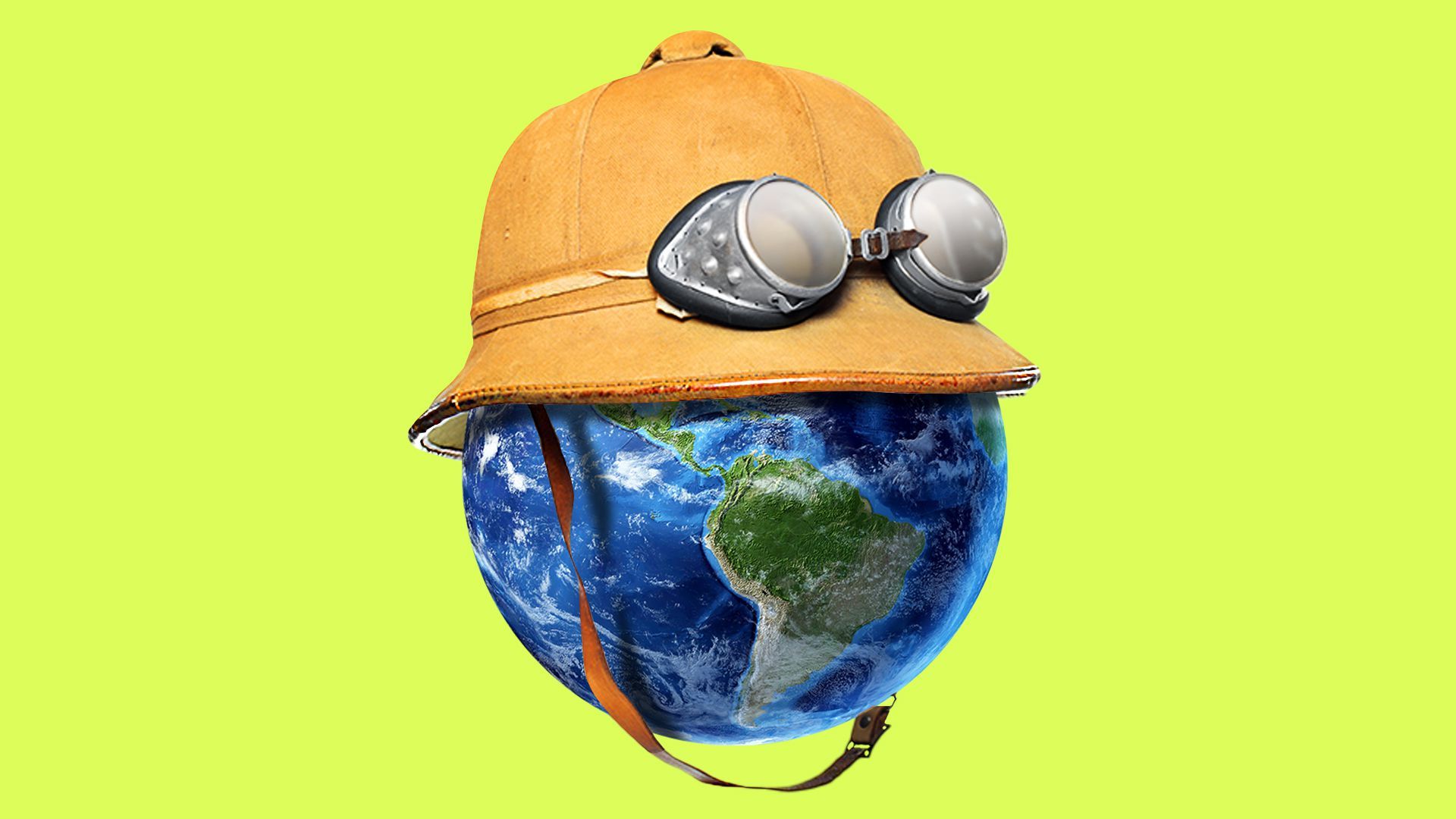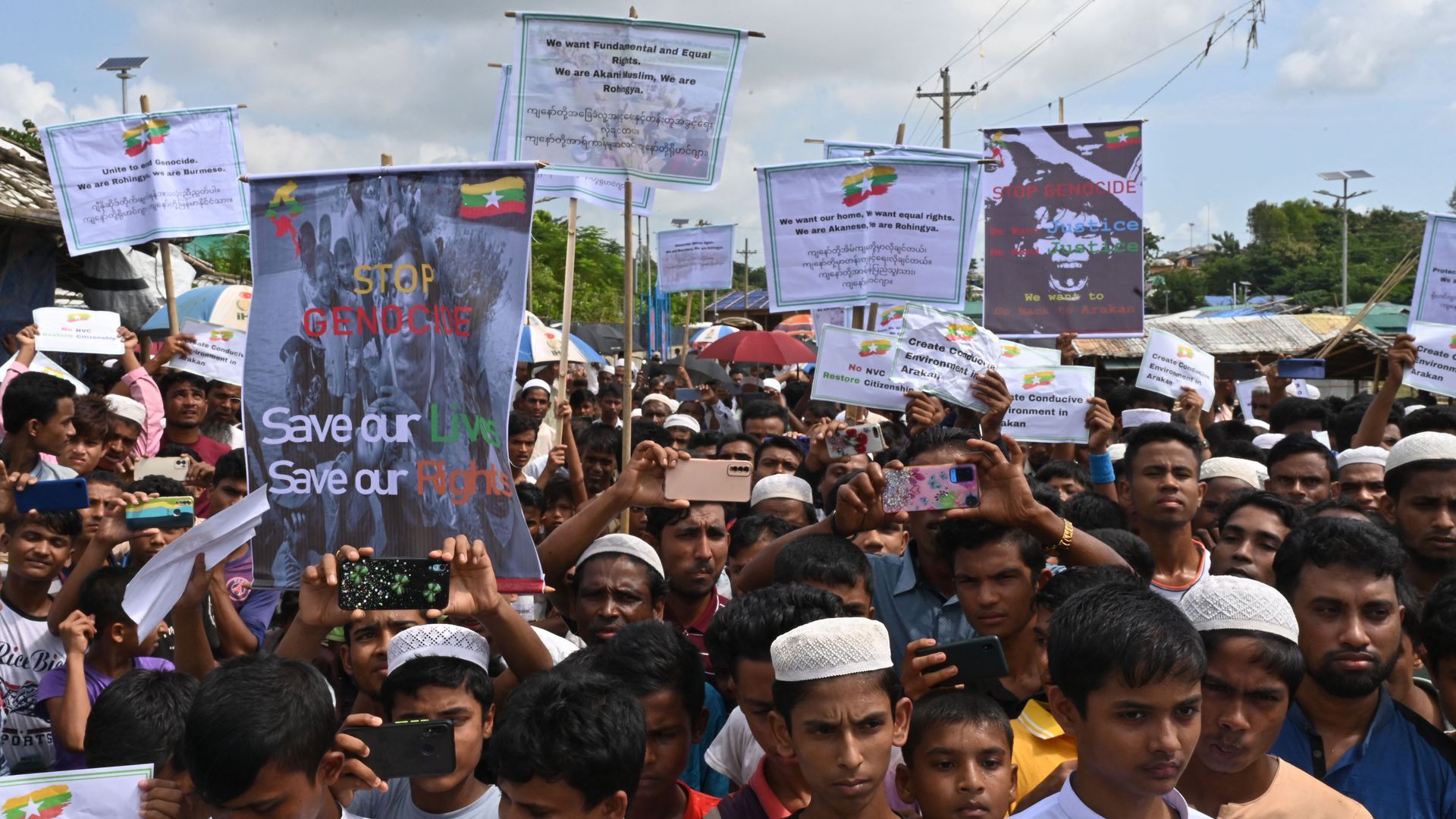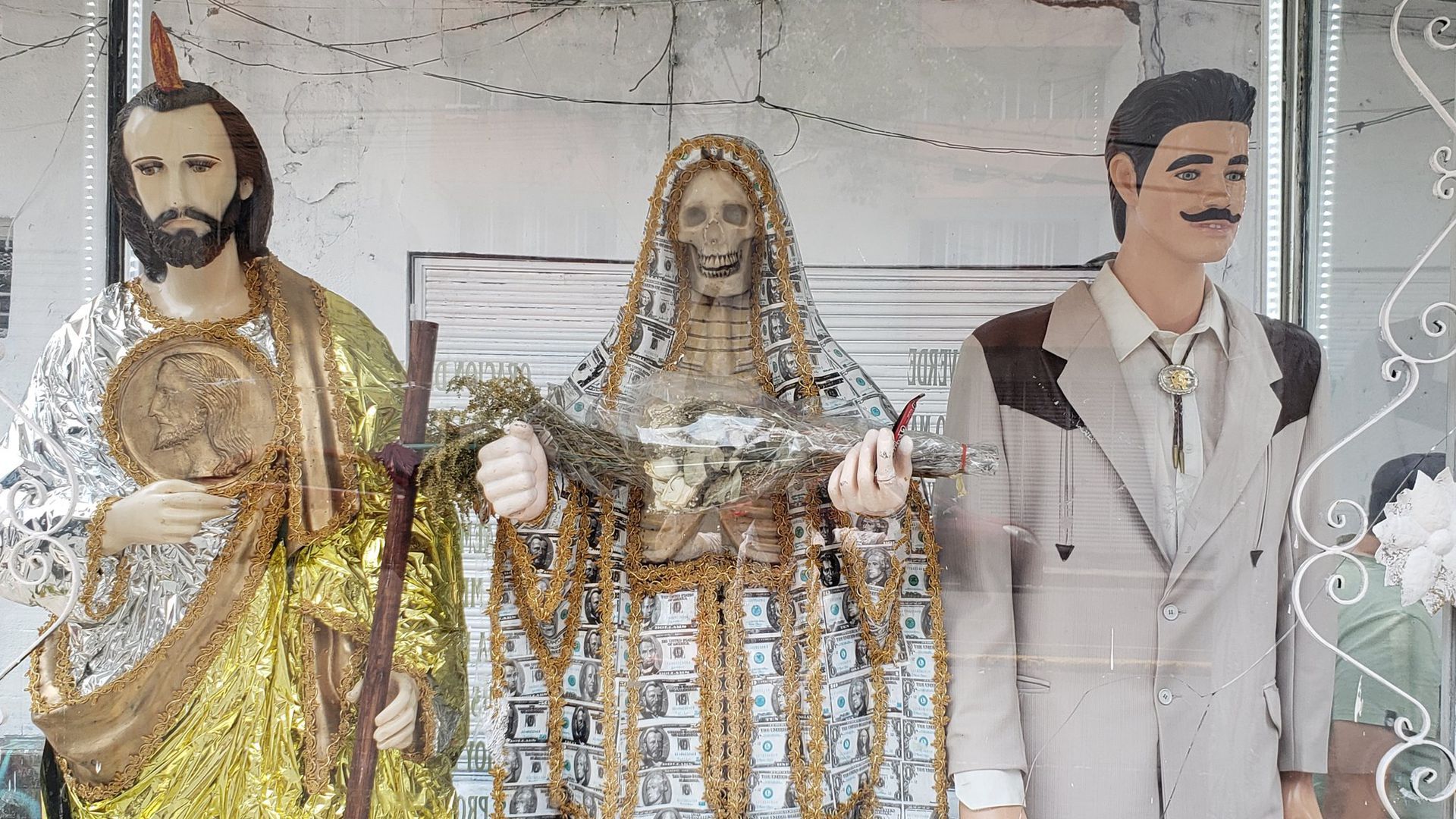| |
| |
| |
| |
| |
| Axios World |
| By Dave Lawler · Aug 25, 2022 |
| Welcome back to Axios World. - Tonight's edition (1,853 words, 7 minutes) starts with a look at all the countries that have prosecuted their former leaders since 2000.
- Mea culpa: I messed up Monday's answer key for Where in the World. No. 7 (Antony and Cleopatra) was Alexandria; No. 8 (Midsummer Night's Dream) was Athens. Thanks for keeping me honest!
|
| |
| |
| 1 big thing: Ex-leaders have been jailed or charged all over the world |
 Data: Axios Research; Map: Nicki Camberg/Axios. Does not include impeachments. "Complicated" includes cases that are unclear, or where a former leader was temporarily detained (often following a coup) but never formally charged. Former President Donald Trump and a number of his close allies have argued that the multiple investigations he's facing, and in particular the search of his Mar-a-Lago property, are something out of a "banana republic." The big picture: Investigations into former leaders are hardly rare around the world. In at least 76 countries, leaders who left office since 2000 have been jailed or prosecuted — including in democracies like France, Israel and South Korea. - Since 1980, around half of the world's countries have had at least one such case, and that's not counting impeachments or coups.
Driving the news: Investigations into former leaders have been in the news around the world lately. - Former Pakistani Prime Minister Imran Khan is facing arrest on terrorism charges for comments he made at a rally. He maintains he did nothing wrong, and his pre-arrest bail was extended today through Sept. 1.
- Former Malaysian Prime Minister Najib Razak is heading to prison after his conviction for corruption in the multibillion-dollar 1MDB scheme was upheld on Tuesday.
- Former Brazilian President Luiz Inácio Lula da Silva is contesting an election after his corruption conviction was thrown out. Meanwhile, former Israeli Prime Minister Benjamin Netanyahu is leading his party into an election while his own corruption trial is ongoing. He says he is a victim of a "witch hunt."
- A prosecutor in Argentina this week requested a 12-year sentence in corruption proceedings against former President Cristina Fernández de Kirchner, though she has legal immunity in her current role as vice president. She's denied any wrongdoing.
Several ex-leaders from wealthy democracies have found themselves on trial in the past two decades. - Like Trump, Former French President Nicolas Sarkozy had his home searched after leaving office. He was convicted in two separate cases last year and sentenced to prison (he's appealing).
- In South Korea, former President Park Geun-hye was sentenced to 24 years for corruption. She was pardoned by her successor in December after serving five.
- In Taiwan, former President Chen Shui-bian was convicted of bribery in 2009.
- Former Italian Prime Minister Silvio Berlusconi has been in and out of court for three decades and was temporarily barred from seeking office due to a tax fraud conviction. But he'll still be a kingmaker in next month's election, at the age of 85.
- He's far from the only leader for whom a trial or even conviction was not career-ending.
For obvious reasons, the countries that are least likely to be filled in on our map are monarchies or dictatorships where leaders are long-serving and untouchable. - In some countries, leaders may be inclined to cling to power due to the risk of prison if they don't. That's one explanation for the trend of African leaders seeking third terms.
- But the region where the most countries have jailed or prosecuted former leaders over the last two decades is Latin America. In Peru, every president but one who served between 1985 and 2018 has been arrested or charged.
- Former Mexican President Enrique Peña Nieto is under investigation for alleged corruption but has not been charged.
In the vast majority of cases all over the world, the charges former leaders have faced relate to corruption. Worth noting: - Because we were looking at cases where leaders were jailed or prosecuted after leaving office, we didn't include impeachments and didn't automatically include coups — though cases where leaders were detained following coups are in the "complicated" category.
- We did include cases where ex-leaders were prosecuted in absentia or faced charges that were later dropped. We didn't include cases where leaders left office before 2000 but were charged more recently (Chile's Augusto Pinochet, for example). We didn't include cases where the charges came solely from international courts.
- In the vast majority of these cases, the ex-leader was prosecuted or jailed for their activities in office, rather than before or after.
- We were only considering leaders who held the most powerful political office in each country, though that required judgment calls in a few cases.
Thanks to Laurin-Whitney Gottbrath and Ivana Saric for helping to compile the data. |
    |
| |
| |
| 2. Global news roundup |
 |
|
| Casting a ballot in Luanda, Angola. Photo: John Wessels/AFP via Getty |
| |
| 1. Fighting erupted in Ethiopia's Tigray region on Wednesday between government forces and the Tigray People's Liberation Front, ending a months-long cease-fire, Axios' Ivana Saric writes. 2. Japan is considering a major pivot back to nuclear power 11 years after Fukushima. 3. Angola's ruling party is on course for victory with 51% of the vote with nearly all ballots counted, 7 points ahead of the main opposition. 4. Thai Prime Minister Prayuth Chan-ocha was suspended pending a Constitutional Court ruling on whether he has violated term limits. - He took power in a coup eight years ago, the maximum tenure for a PM, but he argues the clock started later. Analysts say the court is unlikely to remove him.
5. Taiwan is planning a big increase in defense spending. 6. The Biden administration has urged the Palestinian Authority not to pursue a vote at the UN Security Council on gaining full UN membership, stressing it will likely veto any such move, Axios' Barak Ravid reports. 7. Police in Brazil conducted several raids after text messages leaked showing prominent Jair Bolsonaro supporters expressing support for a coup if he loses in October. 8. El Salvador President Nayib Bukele plans to swiftly build a huge prison to house 40,000 gang members. 9. French President Emmanuel Macron promised to "look back at the past with humility" today during a fence-mending trip to Algeria, a former French colony. - Restoring relations is important for French influence in Africa, and Algeria's energy exports to Europe are also taking on additional importance.
|
    |
| |
| |
| 3. Breaking: Near miss on nuclear disaster, Zelensky says |
 |
|
| The Zaporizhzhia nuclear power plant. Photo: Xinhua via Getty Images |
| |
| Ukrainian President Volodymyr Zelensky said this evening that there was nearly a "radiation accident" today when Europe's largest nuclear power plant was temporarily disconnected from the electric grid. How it happened: Ukraine's state nuclear company said this morning that the Zaporizhzhia nuclear power station had lost its connection to Ukraine's power grid "for the first time in the history of the plant." Fires had damaged power lines outside the station. - Zelensky blamed Russian shelling, while Russia blamed Ukraine. Power outages were reported in the region.
- "If the diesel generators hadn't turned on, if the automation and our staff of the plant had not reacted after the blackout, then we would already be forced to overcome the consequences of the radiation accident," Zelensky said.
- The UN's nuclear watchdog is desperate to gain access to the plant. "Almost every day there is a new incident at or near the Zaporizhzhia nuclear power plant. We can't afford to lose any more time," IAEA chief Rafael Grossi said in a statement.
- Flashback: Russia occupied Zaporizhzhia early in the war and forced Ukrainian workers at the plant to keep it operating.
What to watch: The plant supplies one-fifth of Ukraine's electricity, but U.S. and Ukrainian officials have warned that Russia might try to redirect the electricity to Russia's own electric grid. In related news… Go deeper: State of the war, six months on |
    |
| |
| |
| A message from Axios |
| NEW: Subscribe to Axios Communicators |
| |
 |
| |
| Get the latest topics and trends impacting the way leaders, organizations and employers communicate. Why it matters: Axios Communicators will help inform your strategy and offer insight into the rapidly evolving world of sharing and receiving information. Subscribe for free. |
| |
| |
| Bonus: Where in the world? |
 |
|
| Illustration: Natalie Peeples/Axios |
| |
| I've got a puzzle for you tonight. Can you name the two countries to which all five rules apply? - Has a Z in its name (15 countries left).
- NOT in Europe (12 countries left).
- English is an official language/lingua franca (5 countries).
- NOT landlocked (3 countries).
- Population under 10 million (2).
Scroll to the bottom for the answers. |
    |
| |
| |
| 4. Fears of violent escalation as Iraq's political deadlock deepens |
 |
|
| Supporters of Iraqi Muslim Shiite cleric Muqtada al-Sadr gather outside the Supreme Judicial Council. Photo: Ahmad Al-Rubaye/AFP via Getty Images |
| |
| The deep political deadlock in Iraq has entered its 10th month with no solution in sight and fears of potential civil war, Mustafa Alrawi writes for Axios. The big picture: Iraq held early elections in October 2021 in response to a nationwide, pro-reform protest movement that began in late 2019. Shiite cleric Muqtada al-Sadr's Sadrist movement became the largest bloc in Parliament. - His rivals — the Coordination Framework grouping of Shiite parties, which includes Iran-backed former Prime Minister Nouri al-Maliki — have thwarted al-Sadr's efforts to form a coalition government with leading Sunni and Kurdish parties.
- Al-Sadr has ordered his own MPs to resign and blocked the Framework from nominating its own prime minister.
State of play: Both camps, which command heavily armed militias, have organized protests in the capital Baghdad in recent weeks. - Al-Sadr's followers have breached the secure Green Zone on multiple occasions and protested outside the Supreme Judiciary Council on Tuesday.
- He has demanded the country's judiciary dissolve Parliament, but this has been rejected.
Driving the news: Outgoing Prime Minister Mustafa al-Kadhimi hosted a national dialogue last week that the Sadrist movement refused to take part in, though most other major groups did. For now, the deadlock grinds on. |
    |
| |
| |
| 5. Five years of trauma for the Rohingya |
 |
|
| Rohingya refugees take part in "Genocide Remembrance Day" rally to mark five years since fleeing Myanmar. Photo: Munir uz Zaman/AFP via Getty Images |
| |
| Hundreds of thousands of Rohingya in Bangladesh and elsewhere continue to suffer "unimaginable consequences" five years after fleeing the Myanmar military's bloody campaign against them, Axios' Laurin-Whitney Gottbrath writes. The big picture: The Rohingya, the majority of whom are Muslim, have been described as the "world's most persecuted minority." Thousands were killed and 745,000 displaced in 2017 as Myanmar's military intensified its yearslong campaign against the ethnic minority in what the U.S. and other countries have declared a "genocide" — a declaration Myanmar rejects. - Today, nearly 1 million Rohingya — half of whom are children — continue to live in squalid conditions in overcrowded refugee camps in Bangladesh, where they are largely unable to work, their movements are restricted and rights groups say their human rights are violated.
- Previous attempts to allow the Rohingya to safely return to Myanmar have failed, and the security situation in the southeast Asian nation has only deteriorated since last year's military coup.
- Meanwhile, hundreds of thousands of others are displaced in Myanmar, where they continue to face persecution and violence.
|
    |
| |
| |
| 6. The rise of unsanctioned saints |
 |
|
| From left: Saint Jude, Santa Muerte and Jesús Malverde in Colonia Doctores of Mexico City. Photo: Courtesy of Andrew Chesnut |
| |
| Devotion to unsanctioned Catholic folk saints is one of the fastest growing religious movements in Latin America, Axios' Russell Contreras reports. The big picture: Some Latinos who feel alienated by Christian traditions are turning to saints not sanctioned by the struggling Catholic Church for spiritual guidance around love, crime and money. - Catholic leaders worldwide have denounced unofficial "narco" saints as sinful, but makeshift shrines continue to pop up.
- Believers say unsanctioned saints offer divine assistance to steal gas, move a drug shipment, cross a border, or bless an LGBTQ+ romance.
Go deeper. |
    |
| |
| |
| 7. Stories we're watching |
 |
|
| Celebrating Ukraine's Independence Day, in Warsaw. Photo: Anek Skarzynski//AFP via Getty |
| |
- Putin signs decree to boost size of Russian forces
- Over 900 killed by floods in Pakistan
- International show of support for Taiwan grows
- WHO: Monkeypox cases dropped 21% over last week
- Australia announces inquiry into ex-PM Morrison
- U.S. launches airstrikes on Iran-backed groups in Syria
- France mulls regulations on private jets
Quoted: "We are witnessing the end... of abundance. And for those who might have enjoyed it, it is also the end of a carefree time. Our freedom, the liberty we have grown accustomed to in our lives, has a price." — French President Emmanuel Macron on Wednesday. France has faced severe drought this summer, and energy prices are now spiking due to the war in Ukraine. |
    |
| |
| |
| A message from Axios |
| NEW: Subscribe to Axios Communicators |
| |
 |
| |
| Get the latest topics and trends impacting the way leaders, organizations and employers communicate. Why it matters: Axios Communicators will help inform your strategy and offer insight into the rapidly evolving world of sharing and receiving information. Subscribe for free. |
| |
| Answers: New Zealand and Belize. |
 | | Are you a fan of this email format? It's called Smart Brevity®. Over 300 orgs use it — in a tool called Axios HQ — to drive productivity with clearer workplace communications. | | |
Post a Comment
0Comments